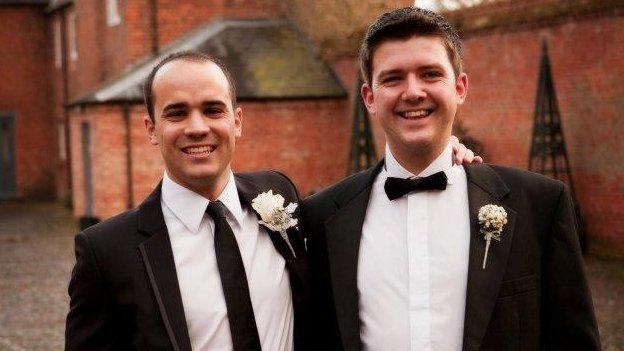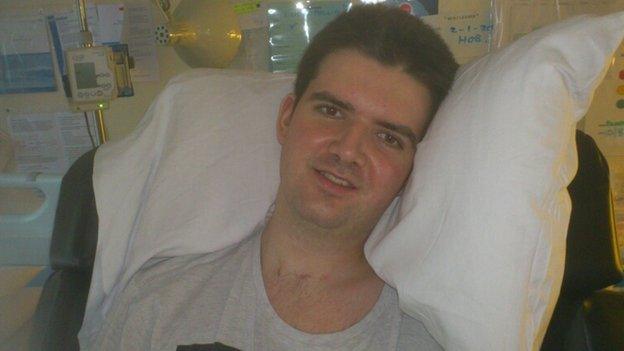Rise in deaths from 'legal highs' in the UK
- Published

Richard Phillips (right) with his brother Byron, was left brain damaged after taking a legal high
The number of UK deaths linked to so-called "legal highs" has risen in recent years - from 10 in 2009 to at least 68 in 2012, figures show.
Researchers compiled post-mortem test results for the National Programme on Substance Abuse Deaths.
Designed to mimic the effects of illegal drugs, "legal highs" are chemically different enough to not be covered by the law.
They are on sale openly on websites and high streets across the UK.
The chemicals - known as New Psychoactive Substances (NPS) - are made on an industrial scale in countries like China and India and then packaged and distributed throughout Europe.
Suppliers can sell many of them legally as long as they write "not for human consumption" on the packets. They are often sold as plant food or bath salts.
The government says it is leading the way globally by banning new drugs quickly.
But often new versions are then cooked up and come on sale almost immediately after a ban comes into place. The European Monitoring Centre for Drugs and Drug Addiction identified 73 new substances in 2012 alone.
Richard Phillips, 26, has been left severely brain damaged after taking the now banned LSD copycat drug N-Bomb at a party. He had been drinking and tiny traces of cocaine were also found in his body.
Doctors told his family that it was probably the cocktail of alcohol and N-Bomb that triggered a series of fits.
His brother Byron Phillips said: "He was intelligent, fun loving and had a great sense of humour. He had a massive heart. He was a loving father and was loved by everyone he met."
His family believe he got the so called "legal high" from a friend who had bought the substance online back in May last year, just a month before the government banned N-Bomb.
"He's dependent on 24-hour care. He can hold his head up and move his arms but that's about as far as it goes. He can breathe for himself but he is fed through a peg in his stomach," said Byron.
"I know for a fact that with everything Rich had in his life he would not have taken this if he knew the risks."
Multiple substances

Richard now needs 24-hour care
Researchers at St George's University of London compiled the post-mortem test results from across the UK. They did not include all post-mortem examinations, so the authors say the number of deaths linked to NPS is probably higher than the 68 recorded in 2012. The reporting system is voluntary, and while most coroner regions provide data, not all do.
However, there is often more than one drug found in someone's system.
John Corkery, co-author of the report, said: "In a fair proportion of cases, for example (the now banned) mephedrone, we are aware there was only one substance taken and it's quite clear that's caused the effects which led to death.
These social work students say they have never touched legal highs, but understand why some people find them appealing
"But in many cases it's a combination of other substances including alcohol but particularly stimulants like cocaine amphetamine and ecstasy."
The government said it was leading the way globally in dealing with the fast moving industry but drugs minister Norman Baker admitted it was a challenge keeping up. He has ordered a review into current laws which is expected to report back in the summer.
"The reality is we are chasing the chemists," he said.
"There are people elsewhere in the world who are busy creating drugs which mimic illegal drugs but are designed to be just outside the legal controls, in order to produce a product which is temporarily legal until we ban it.
"But maybe as dangerous, or more dangerous, than the drugs that are already controlled.
"Eighty-eight per cent of the legal highs associated with deaths have been already been controlled and are banned. So the phrase "legal highs" is a misnomer."
For Byron though, more needs to be done to warn people of the risks of these completely untested substances.
"I'm heartbroken that it is something my brother could get so easily, that could have such a devastating affect," he said.
"I wish that day never happened. I wish he just had a few beers, and I wish he hadn't taken that extra step. I don't know why he did and I will never know, because I can't ask him - or at least he can't tell me why."
- Published13 January 2014
- Published12 December 2013
- Published4 July 2013